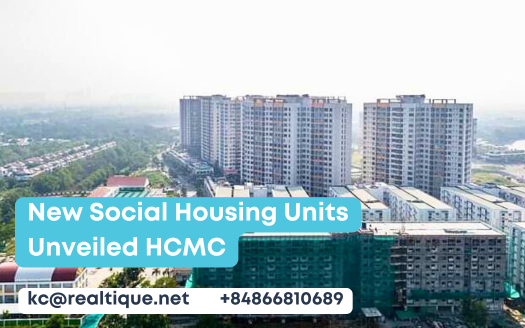New Social Housing Units Unveiled HCMC
The recent revelation of new social housing units in Ho Chi Minh City (HCMC), specifically the EHomeS Nam Sai Gon project, marks a significant step towards addressing the pressing housing challenges faced by low-income families in the city. With 242 units available at a competitive rental rate, this initiative aims to provide affordable, long-term living solutions. However, the implications of such projects extend beyond mere housing availability, prompting questions about sustainability, urban development, and the broader socio-economic environment. What remains to be seen is how effectively these measures will integrate into the city’s changing fabric.
Table of Contents
In recent years, social housing has emerged as a critical component in addressing the housing needs of low-income families in HCMC.
The city has made notable advancements in expanding its social housing initiatives, evidenced by the addition of 242 units in the EHomeS Nam Sai Gon project.
With a monthly rental rate set at 101,000 VND per square meter, this initiative provides affordable housing options for families seeking stability.
Each unit spans approximately 50 square meters, yielding a monthly rent of around 5 million VND.
Importantly, prospective tenants face a minimum rental duration of five years before being eligible for purchase options, ensuring long-term security for residents.
This approach reflects HCMC’s commitment to alleviating housing shortages and promoting social equity.
Project Details and Specifications
The EHomeS Nam Sai Gon project stands as a significant advancement in HCMC’s social housing efforts, featuring a total of 1,460 units strategically located on Nguyen Van Linh Avenue in Binh Chanh District. Developed by Nam Long Company, the project comprises six blocks, with unit sizes ranging from 40 to 75 m². Currently, 1,323 units have been completed, while Block C is available for rental from October 2023, with delivery expected in Q1 2024.
| Block | Total Units | Status |
|---|---|---|
| A | 300 | Completed |
| B | 300 | Completed |
| C | 300 | Available for Rent |
| D | 280 | Under Construction |
| E | 280 | Under Construction |
Recent Developments in Social Housing
Recent advancements in social housing within HCMC reflect a proactive approach to addressing the growing demand for affordable living spaces.
In the first half of the year, two significant projects were completed: Nguyen Son, which introduced 242 units, and a labor housing initiative in Thanh My Loi, comprising 368 units.
Additionally, a new project featuring 1,445 units is currently under construction, with an anticipated completion date set for 2026.
Since 2021, HCMC has developed six projects totaling 2,700 units, while four more are underway, adding 3,000 units to the housing stock.
These developments highlight the city’s commitment to enhancing living conditions for residents and ensuring access to affordable housing options for low-income families.
Future Plans for Social Housing
By April 30, 2025, HCMC aims to accelerate the construction of 5 to 6 new social housing projects, targeting a total of 6,000 new units to meet the increasing demand for affordable housing.
The city is committed to ensuring that the upcoming developments align with the needs of the community through several initiatives:
- Establishing a structure for affordable rental pricing.
- Implementing monthly rental prices ranging from 96,000 to 235,000 VND per square meter.
- Introducing support programs specifically designed for low-income households.
- Ensuring that the new projects incorporate sustainable planning principles.
These strategic actions demonstrate HCMC’s dedication to enhancing housing accessibility for its residents, laying the groundwork for a more inclusive urban environment.
Economic Context and Implications
A significant emphasis on social housing projects in HCMC is essential for addressing the pressing housing shortages in urban areas.
The affordability of rental prices, set between 96,000 and 235,000 VND per square meter, aims to support low-income families, ensuring accessibility to essential housing.
This initiative not only alleviates immediate housing needs but also stimulates the local economy through increased construction activities and job creation.
Moreover, the government’s commitment to integrating social housing into urban planning structures reflects a long-term strategy for sustainable urban development.





